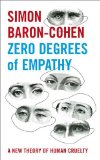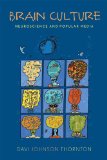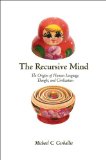May 19, 2011

The Science of Evil: On Empathy and the Origins of Cruelty by Simon Baron-Cohen (Basic Books, 2001)
(kindle ed.)
(UK ed. – Zero Degrees of Empathy – at amazon.co.uk)

Product description from the publisher:
Borderline personality disorder, autism, narcissism, psychosis, Asperger’s: All of these syndromes have one thing in common–lack of empathy. In some cases, this absence can be dangerous, but in others it can simply mean a different way of seeing the world.
In Cruel or Unusual Simon Baron-Cohen, an award-winning British researcher who has investigated psychology and autism for decades, develops a new brain-based theory of human cruelty. A true psychologist, however, he examines social and environmental factors that can erode empathy, including neglect and abuse.
Based largely on Baron-Cohen’s own research, Cruel or Unusual will change the way we understand and treat human cruelty.
See also: Reuters article “Scientist seeks to banish evil, boost empathy,” Royal Institution lecture with audio archive
Comments (0)
- cognitive science,new books,psychology
May 17, 2011

Brain Culture: Neuroscience and Popular Media by Davi Johnson Thornton (Rutgers University Press, 2011)
(amazon.co.uk)
Product description from the publisher:
Brain Culture investigates the American obsession with the health of the brain. The brain has become more than a bodily organ, acquiring a near-mystical status. The message that this organ is the key to everything is everywhere–in self-help books that tell us to work on our brains to achieve happiness and enlightenment, in drug advertisements that promise a few tweaks to our brain chemistry will cure us of our discontents, and in politicians’ speeches that tell us that our brains are national resources essential to our economic prosperity.
Davi Johnson Thornton looks at these familiar messages, tracing the ways that brain science and colorful brain images produced by novel scientific technologies are taken up and distributed in popular media. She tracks the impact of the message that, “you are your brain” across multiple contemporary contexts, analyzing its influence on child development, family life, education, and public policy. Brain Culture shows that our fixation on the brain is not simply a reaction to scientific progress, but a cultural phenomenon deeply tied to social and political values of individualism and limitless achievement.
Comments (0)
- cognitive science,culture,new books
May 15, 2011

The Compass of Pleasure: How Our Brains Make Fatty Foods, Orgasm, Exercise, Marijuana, Generosity, Vodka, Learning, and Gambling Feel So Good by David J. Linden (Viking, 2011)
(Kindle ed.), (amazon.co.uk)
Product description from the publisher:
A leading brain scientist’s look at the neurobiology of pleasure-and how pleasures can become addictions.
Whether eating, taking drugs, engaging in sex, or doing good deeds, the pursuit of pleasure is a central drive of the human animal. In The Compass of Pleasure Johns Hopkins neuroscientist David J. Linden explains how pleasure affects us at the most fundamental level: in our brain.
As he did in his award-winning book, The Accidental Mind, Linden combines cutting-edge science with entertaining anecdotes to illuminate the source of the behaviors that can lead us to ecstasy but that can easily become compulsive. Why are drugs like nicotine and heroin addictive while LSD is not? Why has the search for safe appetite suppressants been such a disappointment? The Compass of Pleasure concludes with a provocative consideration of pleasure in the future, when it may be possible to activate our pleasure circuits at will and in entirely novel patterns.
See also: Author interview at Salon.com
Book website & blog
Comments (0)
- cognitive science,new books
May 6, 2011

The Organisation of Mind by Tim Shallice and Richard P. Cooper (Oxford University Press, 2011)
(amazon.co.uk)
Product description from the publisher:
Brain imaging has been immensely valuable in showing us how the mind works. However, many of our ideas about how the mind works come from disciplines like experimental psychology, artificial intelligence and linguistics, which in their modern form date back to the computer revolution of the 1940s, and are not strongly linked to the subdisciplines of biomedicine. Cognitive science and neuroscience thus have very separate intellectual roots, and very different styles. Unfortunately, these two areas of knowledge have not been well integrated as far as higher mental processes are concerned. So how can these two be reconciled in order to develop a full understanding of the mind and brain?
This is the focus of this landmark book from leaders in the field. Coming more than two decades after Shallice’s classic ‘From neuropsychology to mental structure’, ‘The Organisation of Mind’ establishes a strong historical, empirical, and theoretical basis for cognitive neuroscience.
The book starts by reviewing the history and intellectual roots of the field, looking at some of the researchers who guided and influenced it. The basic principles – theoretical and empirical and the inferential relation between them – are then considered with particular emphasis being placed on inferences to the organisation of the cognitive system from two empirical methodologies – neuropsychology and functional imaging. The core skeleton of the cognitive system is then analysed for the areas most critical for understanding rational thought. In the third section the components of simple cognitive acts are described, namely semantic processing, working memory, and cognitive operations. In the final section, more complex higher-level modulating processes are considered, including, supervisory processing, episodic memory, consciousness and problem-solving.
This will be a seminal publication in the brain sciences – one that all students and researchers will have to read.
Comments (0)
- cognitive science,mind,new books
May 3, 2011

The Recursive Mind: The Origins of Human Language, Thought, and Civilization by Michael C. Corballis (Princeton University Press, 2011)
(kindle ed.), (amazon.co.uk)
Product description from the publisher:
The Recursive Mind challenges the commonly held notion that language is what makes us uniquely human. In this compelling book, Michael Corballis argues that what distinguishes us in the animal kingdom is our capacity for recursion: the ability to embed our thoughts within other thoughts. “I think, therefore I am,” is an example of recursive thought, because the thinker has inserted himself into his thought. Recursion enables us to conceive of our own minds and the minds of others. It also gives us the power of mental “time travel”–the ability to insert past experiences, or imagined future ones, into present consciousness.
Drawing on neuroscience, psychology, animal behavior, anthropology, and archaeology, Corballis demonstrates how these recursive structures led to the emergence of language and speech, which ultimately enabled us to share our thoughts, plan with others, and reshape our environment to better reflect our creative imaginations. He shows how the recursive mind was critical to survival in the harsh conditions of the Pleistocene epoch, and how it evolved to foster social cohesion. He traces how language itself adapted to recursive thinking, first through manual gestures, then later, with the emergence of Homo sapiens, vocally. Toolmaking and manufacture arose, and the application of recursive principles to these activities in turn led to the complexities of human civilization, the extinction of fellow large-brained hominins like the Neandertals, and our species’ supremacy over the physical world.
Comments (0)
- cognitive science,language,mind








